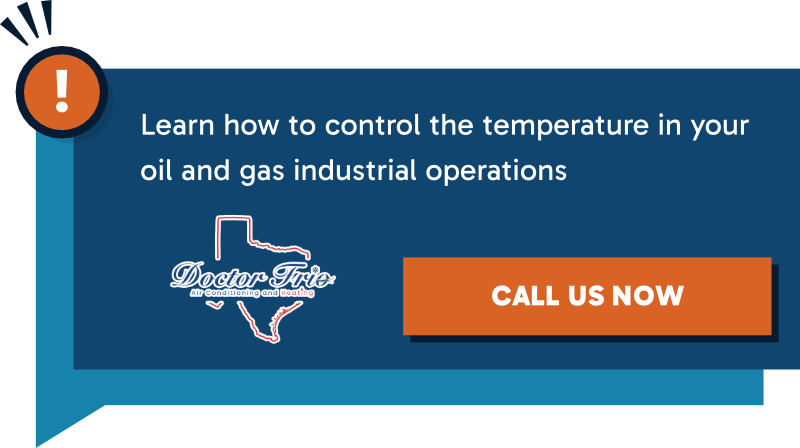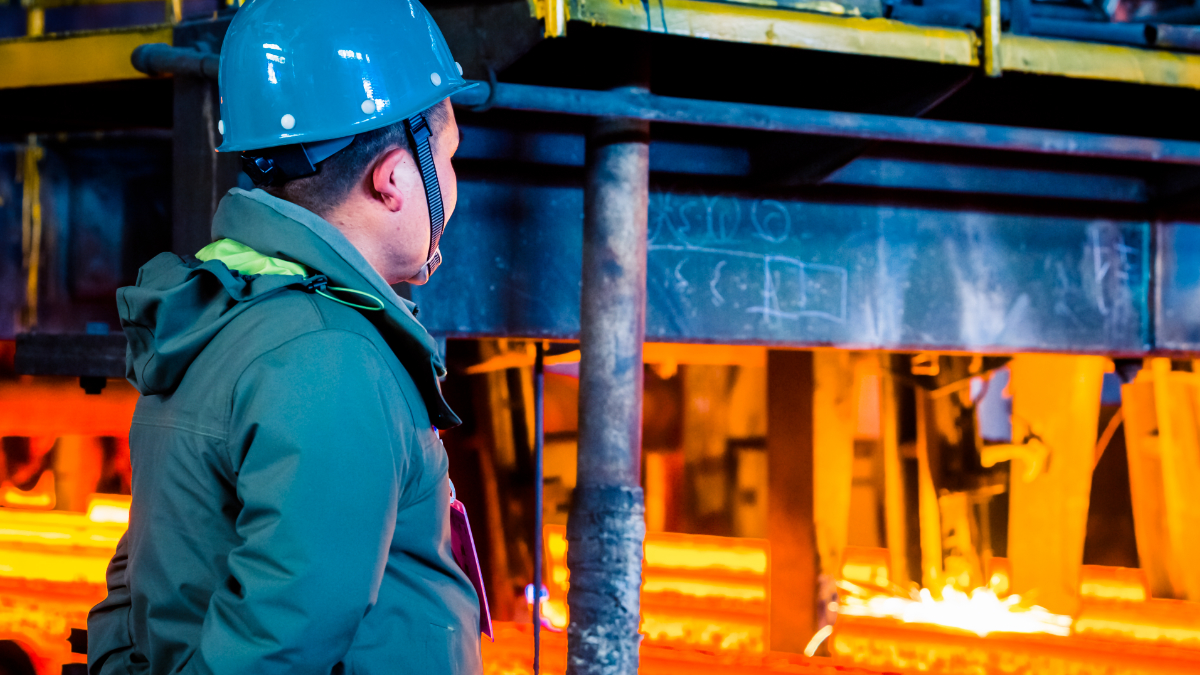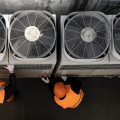In oil and gas processing operations, temperature control is essential to ensure both safety and operational efficiency. Processing plants in areas like West Odessa, Texas, face challenging conditions such as extreme temperatures and high demands in terms of performance and safety.
A properly functioning HVAC system can make a significant difference in temperature control at these facilities, preventing disruptions, improving worker safety, and optimizing productivity.
So, what are the most important aspects that plant managers should consider for effective temperature control in oil and gas processing areas? Let’s take a look:
1. Importance of temperature control in hydrocarbon processing
Oil and gas processing areas require specific temperature and humidity conditions to avoid safety risks and ensure that equipment operates optimally. The presence of flammable substances and hazardous chemicals means that an increase in temperature could be a risk factor. Controlling and maintaining a stable temperature helps reduce the possibility of fires and explosions, while also preventing damage to equipment.
Additionally, maintaining specific temperatures is critical for processes that require precision in the separation, distillation, and refining of hydrocarbons. A well-designed and properly functioning HVAC system ensures that equipment does not need to work harder than necessary, extending its lifespan and avoiding operational downtime.
2. Key factors for HVAC system operation in oil and gas processes
Implementing an HVAC system for hydrocarbon processing requires significant expertise from an air conditioning and heating company in Odessa, Texas, considering the specific challenges of the environment and the needs of each processing stage.
- Safety Zones: Oil and gas processing plants are often divided into zones based on the level of flammability risk. HVAC systems must be suitable for operation in moderate to high-risk areas, minimizing the possibility of generating sparks or heat that could react with flammable vapors.
- Corrosion-Resistant Materials: Facilities exposed to corrosive substances require HVAC system materials that are resistant to corrosion and wear. This includes ducts, filters, and grilles made from stainless steel or other specialized materials that can withstand the aggressive environment.
- Explosion-Proof Ventilation Systems: In areas where there is a high concentration of flammable vapors, it is important for ventilation and HVAC systems to be certified as explosion-proof. This means that electrical components are sealed and designed to prevent any accidental sparks.
3. Temperature Control Technologies to Optimize Efficiency and Safety
Advances in technology have allowed for the development of HVAC systems that improve temperature control accuracy, which is crucial for oil and gas processing areas. Some of the most important technologies include:
- Smart Controllers and High-Precision Sensors: These devices allow the HVAC system to automatically adjust temperature and humidity based on the specific conditions of each area. Real-time temperature and humidity sensors ensure that the system operates only when needed, reducing energy consumption.
- Automation and Remote Monitoring: With integrated energy management systems, operators can monitor and adjust the HVAC system from a central location or even remotely. This not only optimizes performance but also allows for a quick response in case of temperature fluctuations.
- Energy Recovery Systems: Heat recovery systems in high-energy consumption areas allow for the reuse of heat generated in other processes, thereby reducing the strain on the climate control system and optimizing energy efficiency.
4. Preventive maintenance to ensure continuous and safe operation
The continuous operation of HVAC systems is critical in hydrocarbon processing. Without an HVAC maintenance program in oil and gas plants, these systems can experience breakdowns that result in financial losses and operational risks.
Effective preventive maintenance includes:
- Inspection of Critical Components: Motors, fans, filters, and ducts should be inspected periodically to ensure no particles or debris accumulate that could interfere with operation.
- Cleaning Filters and Ducts: Particles in the hydrocarbon processing environment can clog filters and ducts. Regular cleaning reduces the load on the system, decreases energy consumption, and prevents potential failures.
- Performance Monitoring: By regularly monitoring system efficiency, plant managers can identify potential issues before they become major failures, which is crucial for ensuring uninterrupted operation.
5. Compliance with regulations and safety certifications
HVAC systems in the oil and gas sector must comply with strict regulations and certifications to operate in high-risk areas. It is essential that the system is designed and maintained to meet standards such as those from NFPA (National Fire Protection Association) and OSHA (Occupational Safety and Health Administration). Additionally, explosion-proof certifications are necessary in areas where there is a risk of combustion.
When was the last time you diagnosed the HVAC system’s operation in your oil and gas plant?
Temperature control in oil and gas processing areas is crucial to ensure both efficiency and safety in operations. An optimized HVAC system, using advanced technology and properly maintained, enables a stable and safe environment for industrial processes, while also reducing energy consumption and associated costs.
At Doctor Frío A/C and Heating, we have a team of experts specializing in optimizing energy efficiency in oil and gas plants through HVAC systems because we understand the specific needs of the industry. We offer HVAC services for the oil and gas sector that maximize safety and reduce operational costs. Request a call from one of our advisors and discover how we can help you achieve effective temperature control in your plant.




